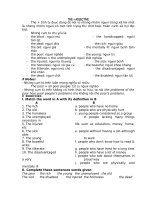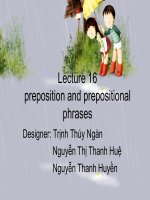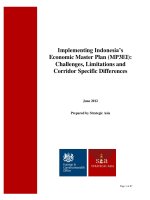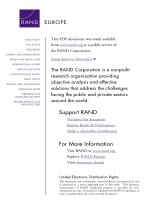Differences betweenAbsolute and PresentPast Participle Phrases
Bạn đang xem bản rút gọn của tài liệu. Xem và tải ngay bản đầy đủ của tài liệu tại đây (26.41 KB, 8 trang )
Differences between
Absolute and Present/Past
Participle Phrases
Trương Văn Ánh
Trường Đại học Sài Gòn
A complex sentence has two clauses: a main
clause and a subordinate clause. The
subordinate clause (often adverb clause) may
be reduced to a phrase.
When the subjects in the two clauses are the
same (person/thing), the subordinate clause is
reduced to a present participle phrase (active
meaning) or a past participle phrase (passive
meaning).
When the subjects in the two clauses are
different persons/things, the subordinate
clause is reduced to an absolute phrase. The
absolute phrase may be a present participle
(active meaning) or a past participle phrase
(passive meaning).
In a present participle phrase or a past
participle phrase, the subject is omitted.
However, in an absolute phrase, the subject
remains.
The conjunctions may remain or disappear.
When the wife came home, she prepared
dinner.
Coming home, the wife prepared dinner.
A present participle phrase
When the husband came home, the wife
prepared dinner.
The husband coming home, the wife
prepared dinner.
An Absolute phrase
When the mother ape was wounded on the
ground, the mother ape felt painful.
Wounded on the ground, the mother ape felt
painful.
A present participle phrase
When the young ape was wounded on the
ground, the mother ape felt painful.
The young ape wounded on the ground, the
mother ape felt painful.
An Absolute phrase
When the palanquin was loaded, we took a
rest.
Adverb clause
The palanquin loaded, we took a rest.
Absolute phrase
Notes: At school students are not allowed to
reduce subordinate clauses to phrases when
the subjects are different in the two clauses.
However, in the texts written by native people,
absolute phrases can be seen abundantly.
Teachers of English should teach our students
how to use absolute phrases.
Good luck!









